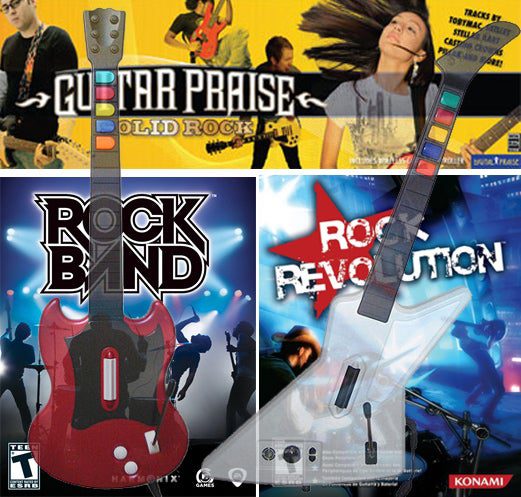They say imitation is the sincerest form of flattery, but they neglected to mention that it’s also a crushing chokehold on the windpipe of creativity. Nowhere is this fact of life more apparent than in this fall’s lineup of upcoming and recently released video games. Look a little closer and you’ll realize—with a few exceptions—that it’s not just this season’s selection of pixelly diversions that suffer from a general lack of originality; it’s a long-running ailment endemic to the entire video game industry.
As I search for a new 3-D plaything to tempt Carpal Tunnel with in the coming months, I can’t help but think: Haven’t I played all of these games before?
Guitar Hero might be the worst thing that’s happened to video games since Uwe Boll. I remember seeing a preview version of the original game in 2005 a few months before its release. At the time, I had trouble deciding if the game was really cool, or just really goofy. Back then, I never would have predicted it to go as gangbusters as it did.
Of course, I’m joking when I say that the game is the worst thing that’s happened to the industry. Like the Nintendo Wii, Guitar Hero has broadened the appeal of video games to a mass audience that was widely considered unreachable just a few short years ago. It’s put video-game consoles into the homes of people who would never—and still don’t—consider themselves “gamers.” How can a game that’s had such a positive effect on the industry possibly be a bad thing?
Copy cats.
Guitar Hero deserves a lot respect for breaking the mold of what was popular and available around the time of its release. The game invented a completely new genre, which isn’t something that happens every day. Sadly, the mold it once shattered has been glued back together—and it’s in the shape of a stringless, plastic five-button guitar.
Guitar Hero begat Rock Band, which took the Guitar Hero formula and added drums, a mic and much-improved cooperative team play. Rock Band then begat Guitar Hero World Tour (available next month), which took the original recipe and copped Rock Band‘s drums and vocals. Line up the instruments, gameplay modes and online features of Rock Band 2 and Guitar Hero World Tour, and you’ll have a difficult time spotting the difference.
I won’t deny the fact that plagiarism has led to some very rapid progression of this new video-game genre. Who knows how long it would have taken Guitar Hero to add other instruments if Rock Band, hadn’t done it first? And, perhaps plagiarism is a little harsh a term given the fact that Rock Band, is actually now developed by the team that originally created Guitar Hero. Both are great games, but their popularity is a mixed blessing. Now that the genre is a proven cash cow, every game publisher and his Mom is cranking out a clone—and, crappy ones at that. Besides the Guitar Hero / Rock Band one-two punch, get ready for Rock Revolution and Guitar Praise Solid Rock. Rock Revolution started out as a carbon copy of Rock Band, but development setbacks have forced the game to drop the guitar and microphone, leaving only a drum set and the half-hearted claim that the game is intentionally more focused on drumming. I haven’t played the game yet myself, but it sounds like a stinker. The only thing saving this wretch is the fact that your Guitar Hero and Rock Band peripherals will work with it. Guitar Praise Solid Rock has something a little stronger in its corner: The game is a Christian rock interpretation/homage/ripoff of Guitar Hero.
Why bother a making a sub-par version of a game that already exists? Because there’s a guaranteed audience for it, which isn’t the case when you try to be original.
We’re seeing this exact same thing happening right now with casual games for the Nintendo Wii. The console comes packaged with Wii Sports, a title that also created a brand new genre in and of itself. Now we’ve got Big Beach Sports, Deca Sports, Game Party and Celebrity Sports Showdown all on shelves or on the way. These games offer a little bit of variety and in some cases even a tiny little bit of improvement over_ Wii Sports_, but none is really anything new. They’re all just easy money.
This isn’t a new phenomenon, either. When Grand Theft Auto III popularized the sandbox style of gameplay in 2001, overnight the entire industry began pumping out clones. In no particular order, we suddenly found ourselves up to our necks in the likes of True Crime, The Simpsons: Hit & Run, Mafia, The Getaway, Driver, The Godfather and Saints Row.
Let’s go back even further. What’s Computer Space but a re-named Spacewar!? What’s Arkanoid but a modified version of Breakout? What’s Super Mario Bro_s. but a (much much) better _Pitfall? In fact, even PONG is a ripoff of a game that already existed on the Magnavox Odyssey home console.
“Most of the ‘me too’ directives definitely come from the publishing/investing side of things,” says Mike Wilson, co-founder of independent publisher Gamecock Media Entertainment. “People see ‘easy money’ games that can sell very well without spending much on development or relying too much on production values or quality in general. Music games, minigame collections, casual games in general. You can compete in these areas with a lot less money, expertise or the need for a big license, and therefore it’s very attractive to those placing the bets.”
Wilson should know. He started his independent label after spending years in a rocky relationship with big-name game publisher, Take Two Interactive. Fed up with producing half-baked sequels instead taking gambles on new IPs, he formed his own publishing house on the belief that creativity and originality should always trump the bottom line. A utopian experiment, if there ever was one. At just a year-and-a-half old, though, it’s too soon to tell if Wilson’s label will be a success or not.
“It’s an uphill battle the whole way to sell something original to the press, retailers and, most importantly, the gaming public,” he says. “We all cry out that we are sick of sequels and licenses and the same old gameplay, but the fact of it is when people vote with their dollars, they shell out for games they are familiar or comfortable with, and for magazines with those games on the cover. It’s so much harder to promote and sell something entirely new that it becomes quite tempting to stop trying.”
Fortunately, Wilson and a few others are still wiling to take a chance every now and then. Some really unique and wonderfully oddball games worth checking out are Echochrome, Spore, Boom Blox, de Blob and Little Big Planet (when it comes out later this year). Echochrome, for one, is a basically a video-game tribute to MC Escher, so you can’t get any further off the reservation than that.
There are also some really exciting things happening on the PS3 and Xbox 360 online networks. “PlayStation Network and Xbox Live Arcade have opened up creativity more than any single development since the PC became a viable gaming platform in the early nineties,” Wilson says. “‘Garage bands’ everywhere are making the games they want to make, with tiny teams and no real need for a publisher/financier relationship in a lot of cases … just like the old days. It’s the perfect proving ground for new paradigms to emerge, which can flourish and rise to the top and then later be refined and taken to the next level as full-blown console games, should the developers (or the copycats) have those ambitions.”
The moral of the story? Try something different. As consumers, the power to have more choice and variety ultimately rests in our wallets. If we keep buying the clones, they’ll keep making them. If we don’t give new, exciting, unproven and original games a chance every once in a while, it becomes less and less likely that these types of games will ever make it off the drawing board.









